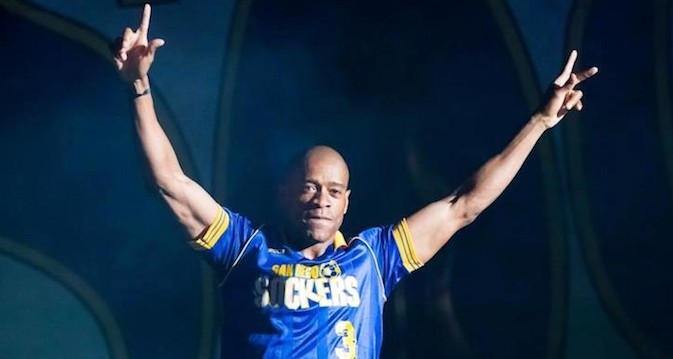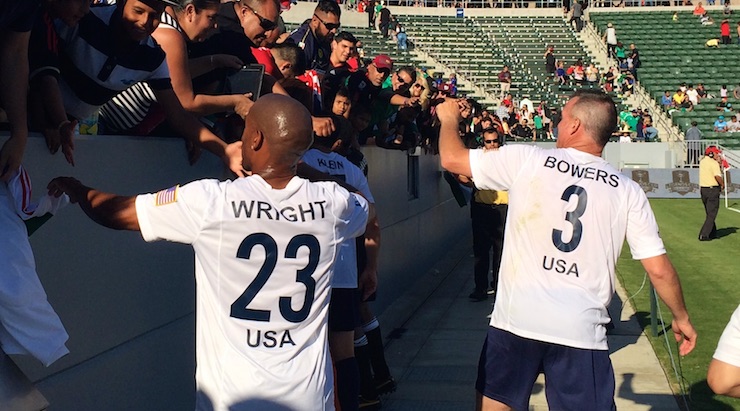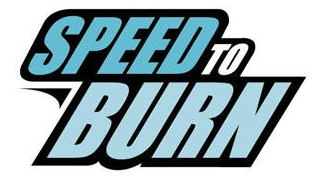Paul Wright on Tips For Being A Great Forward
Not every player is a great striker and not every striker can be as fabulous as the world class Messi … but this advice from former pro Paul Wright can help!
Getting advice from a professional is always wonderful, especially when the person giving the advice really knows how to help youth players reach their potential. Former MLS and indoor soccer playmaker Paul Wright knows what it is like to be an elite youth player and become a successful professional. English-born Wright has trained many high-profile professional and college athletes, including Baltimore Ravens linebacker Ray Lewis, former LA Dodgers outfielder Trent Oeltjen, LA Clippers forward Grant Hill and U.S. Men’s National Team forward Herculez Gomez.
Few professional athletes are as talented as legendary professional soccer player Paul Wright who continues to inspire a new generation of youth player. Well known for scoring goals, Wright was a powerful forward who often succeeded in getting the ball into the back of the net. As one of the fastest soccer players ever, Wright knows what it takes to be successful on the soccer field. For players who dream of becoming a professional, or even just being the best they can be, Wright is one of the top people in the country to train with.
Diane Scavuzzo: As a world class professional soccer player what tips can you share with youth soccer players today who want to be their best on the field?
 Paul Wright: As a former forward, I know what it takes to be successful as a forward.
Paul Wright: As a former forward, I know what it takes to be successful as a forward.
It is a forward’s job to score goals. That is the reason they are on the field.
Soccer games are not usually high scoring matches so there is a lot more to being a successful forward than just getting the ball in the back of the net.
It is important to always look busy on the field.
Never should a forward be standing still.
RELATED ARTICLE: TRAIN WITH PAUL WRIGHT AND GINO CRUMP
Diane Scavuzzo: What should forwards be doing when not striking the ball?
Paul Wright: Forwards should always be walking, jogging or sprinting on the field when they do not have possession of the ball.
Even if a forward has to walk in a circle, looking over his shoulder and shouting constructive directions to his teammates, forwards always need to look busy.
Diane Scavuzzo: What other tip can you share with us for forwards?
Paul Wright: As a forward, when you receive the ball, it is often in a dangerous area where you should be shooting as quickly as possible. Fancy footwork is more of a midfielders job.
It is important for a forward to know how to create space between him or herself and the defender.
Also, knowing the angles and being able to change your speed of play instantly to take advantage of an opportunity. Forwards need to seize opportunities and use change of speed to their advantage.
Diane Scavuzzo: What is the worst mistake forwards make on the soccer field?
Paul Wright: Being stagnant and easy to mark is a big mistake.
The less a forward moves, the easier it is for a defender to mark. Movement is key. If a player is not moving, it is much easier for the defender to watch you and the action on the field.
It is important for a forward to know when to make their run….
Diane Scavuzzo: What does that mean exactly?
Paul Wright: As the play develops on the field, the defender will take his or her eyes off the forward and that is the time a forward should make their run.
Timing is key to the whole puzzle.

Diane Scavuzzo: How are forwards judged?
Paul Wright: Ultimately forwards are judged on putting the ball in the back of the net.
It is a very hard job.
Games are usually not high scoring so if the final score of a match is 2-1 or 3-2, there is not a lot of success scoring goals.
People often ask, what did the forward do? If he stood still or walked slowly around the field waiting for his chance with the ball or did he looked incredibly busy chasing the ball around looking like he was trying to make opportunities — who would you judge more favourably?
“Forwards are judged by their work rate and energy.”
Forwards can easily look like Prima Donnas if they only look like they care about scoring goals. So, until they score, and then again after they score, forwards are also being judged on their actions on the field.
It is also important to stay humble and not become too arrogant. Practice, practice, practice. Confidence comes from doing something over and over again until you know the result before it even happens. Everything else is arrogance.
Diane Scavuzzo: How important is it to look like you are having fun on the field?
 Paul Wright: It is important to show intensity with a passion and spirit for the game — this shows you are enjoying what you are doing.
Paul Wright: It is important to show intensity with a passion and spirit for the game — this shows you are enjoying what you are doing.
Diane Scavuzzo: Has the role of a forward changed since you started playing soccer?
Paul Wright: Today there is a much higher focus on possession style soccer. Nowadays, forwards have to close down on defenders. Years ago, there was not as much emphasis on winning the ball back as quick as possible.
There are different styles of forwards — There are Traditional style forwards like Jozy Altidore and then there are Revolutionary style forwards who use speed to create opportunities and get behind the defense.
Diane Scavuzzo: What did you like about being a forward?
Paul Wright: There is nothing better than scoring goals.
 Wright also founded the Speed To Burn Track Club, which provides an opportunity to young athletes from any sport to participate in running track.
Wright also founded the Speed To Burn Track Club, which provides an opportunity to young athletes from any sport to participate in running track.
Professional players, youth athletes, pro club general managers and industry members speak highly of Wright. San Diego Sockers General Manager John Kentera has always been a big Paul Wright fan. “Wright is a great guy. His power, intelligence and ability to score are just a joy to watch. He is one of San Diego’s greatest athletes and a true champion. Any player would be lucky to train with Wright.”
Amy Lewkovich, the former publicist for the Baltimore Blast is also still a ardent fan. ewkovich shared with us that Wright spent four seasons in Baltimore, playing 167 games in which he racked up 459 points and still remains third on the franchise all-time points list.
Highly sought after for group and private sessions, Wright is known to hop on a private plane to train a pro team. Wright’s training sessions can accommodate individuals, small groups, teams and can be tailored to the athlete’s specific sport and need. Email Paul Wright for more information.
Related Articles: Paul Wright’s Right Track Developing Players, Paul Wright Helps EPL’s Fulham Academy Train Youth Soccer Players
Republished by popular demand






